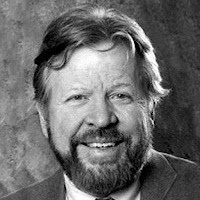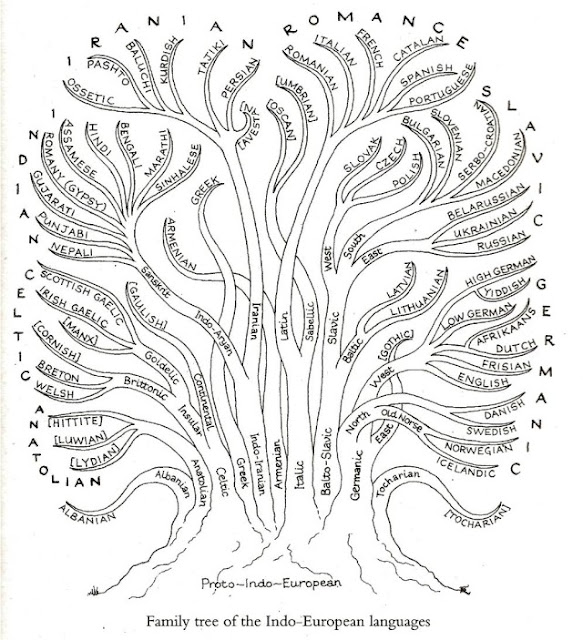HOW LANGUAGE BEGAN
AND THE HUMAN UNDERSTANDING OF TIME
Daniel Everett's New Theories About The Evolution Of Language
INTRODUCTION
Dan (Daniel) Everett has proposed a revolutionary theory about the way human language developed. If he is correct, his theory may be quite important as it will help us understand the nature, purpose, and evolution of language -- a set of symbols which Everett believes has made us the most powerful animal on this Earth. The title of his book that discusses his ideas is How Language Began. Everett thinks these new ideas are so significant he subtitled his book: The Story of Humanity's Greatest Invention.
Dan (Daniel) Everett
A SUMMARY OF EVERETT'S IDEAS ABOUT THE EVOLUTION OF LANGUAGE
Unlike most modern linguists, Everett believes the development of language began much earlier than previously thought. It began perhaps two million years ago with the appearance of Homo erectus (Upright man) who was an early ancestor of us modern humans who only appeared about 200,000 years ago.
It has taken Everett a lifetime to come to this conclusion. But it began when he studied the very difficult language of the Piraha in the Amazon. The language uses only the present tense and it does not allow phrases to be nested or inserted within a sentence -- known as recursion in linguistics. So basically it is a language of direct independent sentences. Instead of saying, for example, "This is the house that Jack built." The Piraha might say "This is the house" -- referring to a specific house in the village, followed by "Jack builds this house." This directness and sense of immediacy of the Piraha have been called the 'immediacy of experience principle' by Everett who speaks Piraha fluently and is the acknowledged expert of this language. This language reflects the Piraha's point of view which is that everything must be related to direct experience. So they have no creation myths, for example, which again is very unusual.
A tree that shows the roots and development
of the family of Indo-European languages
Recursion is an important concept in linguistics because all languages except the Piraha language use recursion. And modern linguistic theory known as Universal Grammar or UG is based on it. But the one exception to this rule, that of the Piraha, has caused a firestorm in the world of linguistics.
For about fifty years, UG has dominated linguistics. The basic ideas as formulated by Noam Chomsky is that language was created by Homo sapiens and that an ability to learn and know a language and use basic grammar is hardwired in our brains. For proof, he points to the fact that all languages (except the Piraha) share basic grammatical rules and structures -- even though many languages developed independently of each other.
But this one exception of the Piraha has opened a door into an entirely new way of looking at language. Everett now believes that language evolved in basically three stages:
- G1: A basic language spoken by Homo erectus, our ancestor, beginning perhaps more than a million years ago
- G2: An intermediate language of immediacy like that of the Piraha
- G3: Modern language which uses recursion, verb tenses and ways to express time
The most basic initial language is G1 which would have been spoken by Homo erectus and which took probably more than a million years to evolve. G2 would be the next stage, in between G1 and G3 -- and this language would be very similar to that of the Piraha -- a language based on immediate experience. The last stage of evolution, G3, would be modern languages as spoken today. There are about 6500 modern languages and all adhere to Chomsky's theory of Universal Grammar (UG), except for the Piraha language.
Further, Everett does not believe that language is hardwired in our brains but rather that it evolved just as human culture evolved.
TIME AND LANGUAGE
And now this is where my thoughts about time (this blog is about the human experience of time) come into play. My ideas may help explain how language developed from the beginning and also why the language of the Piraha is constructed the way it is.
I believe humans have an actual and unique sense of time -- and by that, I mean a sense just like touch, taste, and smell. I wrote a detailed blog post about this in which I cited a study at McGill University in Canada. I believe we are the only animal that has this particular sense of time.
In another study, also cited in this same blog post, the author of the study claimed that we humans are the only animals that have a concept of 'when' in linear time. While animals live in the present time and also are aware of cyclical time (sunset, sunrise, fall migrations), they do not understand linear time. However, humans can place past, present and future events on a timeline in a linear fashion and then work with this timeline to share, plan, organize and coordinate. See my blog about this which is my most popular blog with over 6000 views and downloads.
-- Animal Senses Compared to the Human Sense of Time
https://deconstructingtime.blogspot.com/2014/08/animal-senses-compared-to-human-sense.html
The worldwide appeal of the game of chess -- which uses a number of planning skills.
According to the Concise Oxford English Dictionary the noun "time" is the most used noun in the English language demonstrating how important time is to language. Other time-related words are used almost as often. I assume this is also true for other languages.
Today all spoken languages (except the Piraha) have a wide variety of verb tenses or ways of expressing time. It is hard for us to imagine a language without this ability -- which may be why so many people have trouble understanding the Piraha language. In fact, as I have written, our sense of time and our ability to express this sense of time is embedded in all languages.
-- How Our Concept of Time Is Embedded & Derived from Our Language
https://deconstructingtime.blogspot.com/2017/02/concept-of-time-embedded-in-language.html
TIME AND HOMO ERECTUS
As Everett pointed out, two million years ago it appears that Homo erectus could plan and organize, based on evidence from archaeological finds. So it stands to reason that Homo erectus had the ability to speak in an early language since planning and organizing required communication. But planning and organizing also required an understanding of time -- they go hand-in-hand together, so to speak.
Handaxes made by Homo erectus
I believe that from the very beginning this sense of time was a principal driving force that led to the creation of language. If people had a sense of time, they then needed a way to communicate this understanding of time so that they could plan, share and coordinate their activities. As they became more proficient, they gained more control over their environment. This meant that this human understanding of time helped them survive. As humans developed, for example, they could make tools and spears in preparation for a future hunt when they knew, from prior experience, that animals would be in their area. Since survival is a key driving force of all living things, this ability to work with time became increasingly important.
TIME AND THE PIRAHA LANGUAGE
Quoting from the New Yorker article about Everett's work:
Brent Berlin [Overton Brent Berlin] believes that Piraha may provide a snapshot of language at an earlier stage of syntactic development. “That’s what Dan’s work suggests,” Berlin said of Everett’s paper. “The plausible scenarios that we can imagine are ones that would suggest that early language looks something like the kind of thing that Piraha looks like now.”
-- The Interpreter
https://www.newyorker.com/magazine/2007/04/16/the-interpreter-2
A Piraha group in the Amazon.
I believe an early language would be present-oriented as in animal behavior but also conceptual like human thought, i.e., somewhere in between. The language would have one foot in the immediate world of animal perception and the other foot in the world of human concepts, so to speak.
Animals live in the moment, for the most part, and as a result are better at momentary tasks according to one study. As reported in an article from the American Association For The Advancement Of Science, recent studies have shown that animals may actually be quicker and more skilled at momentary tasks than humans.
"It would be extremely rare to find a human with the “extraordinary working memory” of a chimpanzee...but the reasons for this may stem from a tradeoff between memory and language." [ED: memory mentioned here indicates the human preoccupation with time]
http://www.aaas.org/news/releases/2013/0214_primate_cognition.shtml
It stands to reason that if concepts of time were important to the invention of language, then early human concepts of time would be anchored around the present and the immediacy of the 'now' moment which is the fundamental aspect of time.
T.S. Eliot defined the 'now' moment better than anyone -- because in a sense, 'now' is all there is.
At the still point of the turning world. Neither flesh nor fleshless;
Neither from nor towards; at the still point, there the dance is,
But neither arrest nor movement...
Except for the point, the still point,
There would be no dance, and there is only the dance.
...
All is always now.
T.S. Eliot, Burnt Norton (1935)
As for recursion, it struck me that in most cases, recursion is used to express a time concept. Take the example: "This is the house that Jack built." The 'house' exists now in the present, but in the recursive phrase "that Jack built" we find the house was built in the past by Jack. In other words, recursive phrases are often, in a sense, 'time-stamped' and express a relationship in time -- which the Piraha do not need or want.
TIME AND MODERN LANGUAGES
My ideas about time and language also work very nicely with languages that have evolved to the G3 level of modern languages. According to Everett and Chomsky, all modern languages have a full range of verb tenses or ways to express time along with recursion. While the human sense of time gave humans an ability to understand the way the world operated in time, language gave humans the ability to manipulate time. In short, language gave humans the tools to work with time.
For words are to thought what tools are to work; the product depends largely on the growth of the tools.When a G3 level of language evolved, humans were fully aware of the past and fearful of their future. Humans now understood that everything had a past and came from the past. They also understood about the future -- that it was uncertain and that events which had happened in the past, such as floods, earthquakes, diseases, crop failures, and invasions, could happen again. This understanding about the past and future (a kind of linear timeline) led to creation myths which explained where the world came from in the past and a mythology of gods and goddesses who might be influenced by human rituals to assure a satisfactory future.
Will Durant, History of Civilization: Part 1
WHICH CAME FIRST? A SENSE OF TIME OR THE INVENTION OF LANGUAGE?
One basic question remains: Which came first, the sense of time or language? I would suggest that it is a chicken or the egg kind of question. A more sophisticated understanding of time led to more complex ways to express it in words; a more complex language led to a deeper understanding of the sense of time and a better memory ability -- and so on. I have attempted to write a blog about this:
-- Patterns & Memory
https://deconstructingtime.blogspot.com/2013/11/patterns-memory.html
______________________________________
AFTERWORD
Helen Keller reading the lips of Mrs. Coolidge, the President's wife.
Here is a concrete example of how closely language and time are related. Read Helen Keller's autobiographical story about being deaf, dumb, and blind and then going from an animalistic state to a conscious human one. When she suddenly learned words, she also suddenly understood time. See my blog about this:
Time & Consciousness
https://deconstructingtime.blogspot.com/2014/12/time-consciousness.html
______________________________________
LIST OF MY BLOG POSTS THAT RELATE TO TIME
AND EVERETT'S HOW LANGUAGE BEGAN
After seven years of writing this blog, I feel that Everett's theory of How Language Began fits very nicely with my ideas of the unique human capacity to understand linear time along with the development of a sophisticated understanding of past, present and future time. I believe this human ability to both understand and manipulate time provides the missing piece to the puzzle of Everett's work and also, perhaps, provides the engine that drove the development of language. More complex time concepts and words in language allowed humans to have more control over their environment which gave them more survival skills, survival being the driving force.
Animal Senses Compared to the Human Sense of Time
https://deconstructingtime.blogspot.com/2014/08/animal-senses-compared-to-human-sense.html
Patterns & Memory
https://deconstructingtime.blogspot.com/2013/11/patterns-memory.html
The Human Revolution: Symbolic Culture
https://deconstructingtime.blogspot.com/2013/11/the-human-revolution-symbolic-culture.html
How Our Concept of Time Is Embedded & Derived from Our Language
https://deconstructingtime.blogspot.com/2017/02/concept-of-time-embedded-in-language.html
Time & Consciousness
https://deconstructingtime.blogspot.com/2014/12/time-consciousness.html
Virtual Human Meta-Time
https://deconstructingtime.blogspot.com/2013/01/virtual-human-meta-time.html
The Ancient Manipulation of Time: Part 1
https://deconstructingtime.blogspot.com/2013/01/the-ancient-manipulation-of-time-part-1.html
Creation Myths and Consciousness
https://deconstructingtime.blogspot.com/2017/04/creation-myths-and-consciousness.html
The Birth of Gods in the Neolithic - The Ideas of Jacques Cauvin
https://deconstructingtime.blogspot.com/2017/12/birth-of-gods-in-neolithic-ideas-of-jacques-cauvin.html
The Development of Consciousness & the Origins of Religion
https://deconstructingtime.blogspot.com/2015/04/the-development-of-consciousness.html







